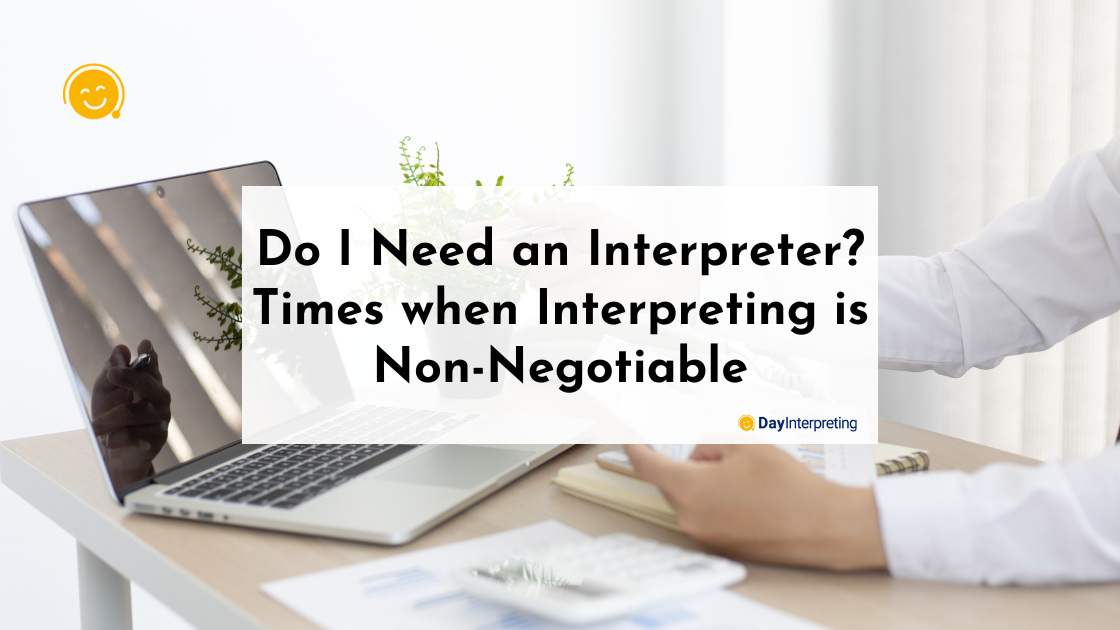Globalization is dramatically increasing the need for interpreting services. The US Labor Bureau expects jobs in this sector to grow by 24% between now and 2029. Language barriers are a common issue when you’re stepping into a multilingual environment. If you’ve ever asked yourself “do I need an interpreter?”, the chances are more than likely that you do!
Everyone may need an interpreter at some point, for example:
- Individuals studying abroad.
- Business conglomerates who wish to expand.
- Traders entering international markets.
- Health-care personnel who counsel patients across the world.
What Do Interpreters Do?
Language interpreters help people understand each other—no matter the language they speak.
Sometimes they translate languages back and forth between one language and another to facilitate a conversation, like in medical interpreting. And other times they may translate to a single target language, like in conference interpreting.
They’re also aware of cultural nuances and translate the correct meaning behind speech, rather than doing a simple translation. While translation software is becoming more powerful, it can’t detect nuance behind speech.
That’s why you’ll never see people in a business meeting using Google Translate to close a deal.
When Do I Need an Interpreter?
Interpretation and translation services can help you in many scenarios, for example:
- Discussing business with international clients.
- International holiday tours.
- Counselling international patients.
- Taking international meetings (in-person or video meetings)
- Giving lectures to international students.
- Forming new business plans.
- Conducting global exhibitions.
- Ensuring maximum patient compliance globally.
Benefits of Working with an Interpreter
Businesses and individuals alike can benefit from using a qualified interpreter.
And while there’s a long list of benefits of translation services depending on the situation, these are our top five:
1. Efficiency and Perfection
Using a professional interpreter for translation services eliminates errors so your message is relayed to the listener with accuracy.
The interpreter will communicate your message with cultural nuances intact, ensuring there is no room for any miscommunication.
For example, closing an international contract is a huge deal for business owners. Losing out on such an opportunity due to a language barrier can be dreadful. But by hiring a professional interpreter, you can ensure you understand the client’s needs—even if they don’t explicitly share them.
2. Cultural Inclusivity During Communication
It’s pretty easy to miscommunicate when you’re dealing with different cultures and languages. Language isn’t just words, it’s history and customs too. It is a depiction of how cultures operate and what is acceptable.
What may sound appropriate in your culture may be offensive in another and can create a huge disaster if ignored—especially in a high-stakes situation.
A professional interpreter is mindful of the cultural nuances in each native language and adjusts the original message to fit them.
3. Clear Transference of Facts and Figures
Communicating facts and figures is tricky business, especially if you operate in a technical niche such as medical or engineering. Professional interpreters are aware of these tricky situations.
Imagine miscommunicating a diagnosis to a patient due to a language barrier—not an ideal situation. Or reporting your research findings wrong during your dissertation in an international university.
Professional interpreters invest in themselves, so they also tend to be subject matter experts with deep knowledge of specialized terminology and professional proficiency. So, they can keep the integrity of the information intact when interpreting what you want to say.
4. Using the Right Linguistic Terms for Marketing Materials
In each language, there are idioms and phrases that only a native speaker can understand.
Knowing these terms can help your audience feel connected to your message. But what should you do if they speak another language? Most idioms don’t translate well, but different cultures often have idioms with similar meanings.
So, if you use a professional interpreter, they’ll often know the best interpretation to use to convey your message. And by translating your words to a familiar idiom, your interpreter helps your audience connects on an emotional level.
5. Preventing Awkward Moments with Translation Services
Learning a new language takes a while to master—especially if you want to use it in a high-pressure business situation.
If you’re attending a business meeting or speaking at a conference, ums and ahs can ruin an effective message. So, unless you’re 100% confident in your language ability, it’s a good idea to hire an interpreter.
Language interpreters can match your rhythm and energy to ensure effective communication.
Now You Know the Answer to the “Do I Need an Interpreter?” Question!
Human translators come in handy in many situations from professional business meetings to medical appointments. So if you interact with people across language borders, consider hiring an interpreter to ensure smooth communication.
Day Interpreting gives you access to more than 1,500 skilled interpreters worldwide across many different languages. You can work with the same interpreter every time and they’re just a call away. Just head to our website, click get an interpreter, and you’re ready to go.





0 Comments